The Gulf monarchies have been active partners in the United States-led coalition against so-called Islamic State (or Daesh, al-Dawla al-Islamiyya fil Iraq wa al-Sham) since its launch in September 2014. Nevertheless, regional rivalries and shifting alliances involving states and non-state actors are increasingly influencing the Gulf monarchies’ efforts against the self-proclaimed caliphate. Geopolitical factors impede a full cooperative approach against the mutual threat of transnational jihadism.
Supporting the military campaign
The engagement of the Gulf monarchies – Bahrain, Kuwait, Oman, Qatar, Saudi Arabia and the United Arab Emirates – along with Jordan (not a member of the Gulf Cooperation Council) involves three complementary axes: military, financial and cultural.
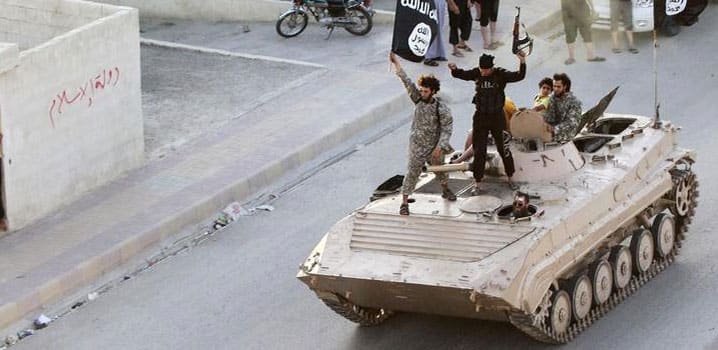
Militant Islamist fighters parade along the streets of northern Raqqa province, Syria, June 2014. © Reuters
From a military point of view, Jordan and the United Arab Emirates (UAE) have been the most active Arab partners within the Global Coalition. Their airstrikes peaked after a young Jordanian pilot from a prominent tribe in the southern city of Karak was imprisoned and burned to death by Daesh in February 2015. With well-honed military skills, Jordan represents the Gulf’s western flank but it is also deeply connected to the Levantine social tissue. Amman’s role has been critical in training the Free Syrian Army.
Beyond support for the coalition against Daesh, Jordan is hosting NATO-led efforts to build the capacity of Iraqi officers in areas such as countering improvised explosive devices, explosive ordnance disposal and demining.
The UAE have built the most capable air force of the Gulf Cooperation Council (GCC). According to the U.S. State Department’s Country Report on Terrorism, the number of Abu Dhabi’s sorties flown against Daesh is second only to Washington. Emiratis have been increasingly able to conduct aerial refueling and to perform strikes against dynamic targets, such as armoured vehicles and troop transports. By comparison, Saudi Arabia predominantly strikes fixed and static targets such as military headquarters, training camps and facilities. As was the case during the Libyan campaign, Qatar doesn’t bomb but supports the Global Coalition by conducting combat air patrol operations over Syria. (See Frederic Wehrey’s article for more on GCC contributions)
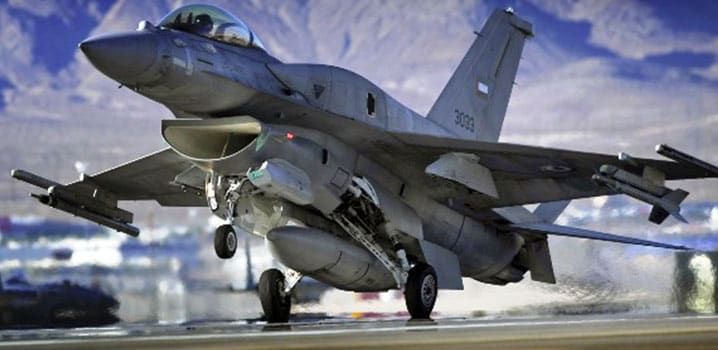
United Arab Emirates have been one of the most active Gulf partners within the Global Coalition (UAE Air Force F-16). © IraqiNews.com
Cutting off jihadi financing
Private financial contributions to armed jihad are a sensitive issue for Gulf monarchies vis-à-vis Western partners. Kuwait emerged as the financial hub for individuals or charities willing to support extremist Sunni militias in Syria. This trend, which peaked in 2012, was possible due to a de-regulated legislation on association freedom and money transferring.
From 2014, Gulf monarchies began to revise national legislation, introducing laws to prevent jihadi fundraising, monitor charities’ activities, withdraw the citizenship of nationals suspected of terrorism, and tackle jihadi financing and recruitment on the web. Royal decrees have been promulgated to increase penalties for terrorism-related crimes and strengthen finance regulations on counterterrorism. However, some grey zones persist: for instance, the classic hawala system of money transfer (illegal in Oman) can be used as an informal means to finance insurgent activities.
Bahrain, the regional financial centre, has hosted several international conferences and workshops on this topic over the past couple of years. Moreover, in May 2016, GCC countries and Canada launched a strategic dialogue to stop jihadi financing. Among other measures, Kuwait constituted the Financial Intelligence Unit devoted to the inquiry of illicit activities, while Saudi Arabia introduced new incentives for whistleblowers, offering fiscal reward to anyone who denounces jihadi fundraising and money laundering (Riyadh also co-chairs the Counter-IS Finance Group with United States and Italy).
While necessary, some of these counter-terrorism measures have generated debate among analysts, given that they could also be used as effective tools to repress political dissent, maximising monarchical control of the public sphere.
Countering the jihadi narrative
Alongside the military and financial tools, the containment and eradication of jihadi activities require coordinated counter-ideological efforts. Gulf monarchies have come to realise that Daesh could not be turned into an anti-Iranian proxy: not only have many Gulf citizens joined the so-called caliphate as mujahidin but, since 2015, the number of terrorist attacks on the GCC soil has risen, targeting predominantly Shia communities in Saudi Arabia and Kuwait. So the defeat of Daesh has progressively become decisive for Gulf monarchies’ national security too, raising the threat perception in the Arab Gulf and, consequently, enhancing opportunities for cooperation between GCC members and Western countries.
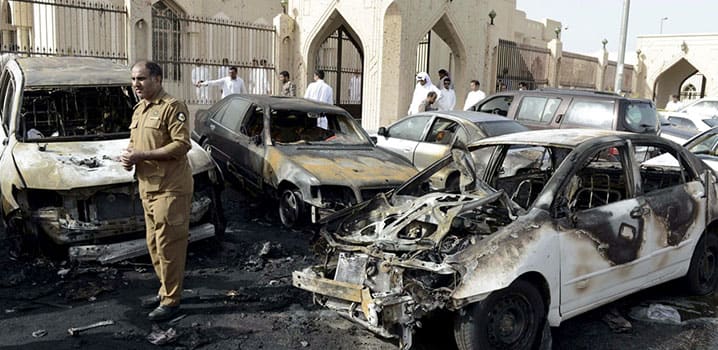
The number of terrorist attacks on the Gulf Cooperation Council soil has risen, targeting predominantly Shia communities in Kuwait, as well as Saudi Arabia. © Aljazeera.com
According to official data, at least 2500 Saudis and 2000 Jordanians joined Daesh, as well as 70 Kuwaitis, 10 Qataris and 15 Emiratis (unofficial estimations). The Arab Gulf’s imams and muftis have multiplied public condemnations of Daesh, rejecting the ideological core of the so-called caliphate’s political project, which challenges the legitimacy of the al-Saud monarchy, as testified by the recent failed attack next to the Holy Medina’s mosque.
Counter-propaganda is one of the keys to disempower jihadi narrative both at the macro and the micro level. For instance, Kuwait has distributed circulars to mosques with approved language for Friday sermons. Abu Dhabi’s Hedayah International Centre of Excellence for Countering Violent Extremism has organised conferences and workshops on jihadi ideology. In partnership with the United States, the UAE government has set up the Sawab Centre in Abu Dhabi, a social media platform aimed to counter extremist narratives and online propaganda.
The geopolitical factor
All the members of the Global Coalition have the same objective – defeating Daesh – but each partner has its own preferred scenarios for how the Middle East should look like afterwards. Therefore, regional powers’ competing interests tend to prevail, getting in the way of a full cooperative approach against the mutual threat of transnational jihadism.
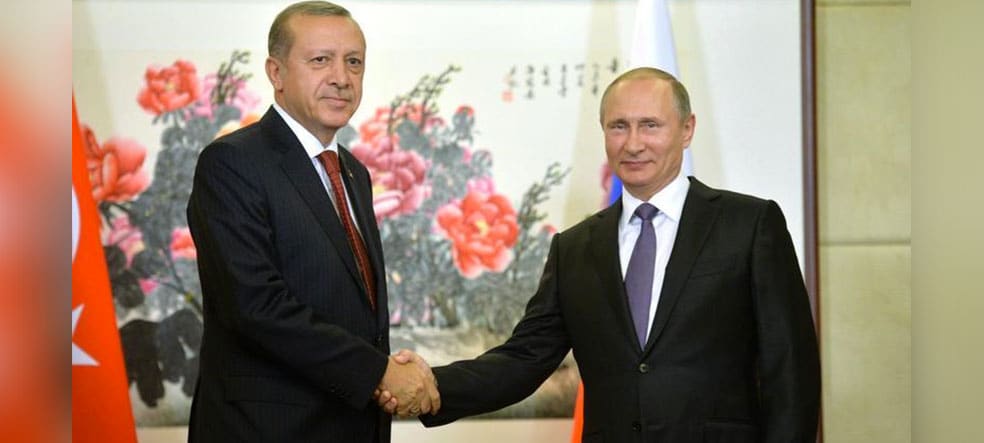
Another sign of Turkey’s recent rapprochement with Russia: President Vladimir Putin (R) meets with his Turkish counterpart Recep Tayyip Erdogan ahead of the G20 Summit in Hangzhou, China, 3 September 2016. © Sputnik/Kremlin/Alexei Druzhinin/via REUTERS
The fight against the so-called caliphate has become inextricably intertwined with the Saudi-Iranian rivalry for regional hegemony. Like a poison, sectarianism has exacerbated confessional and ethnic rifts for the purposes of power politics, providing more ideological space for jihadi networks than before, especially in weak states. Coupled with last year’s deal on Iran’s nuclear programme between the “P5+1” (the UN Security Council's five permanent members plus Germany) and Iran, the stratified Syrian conflict mirrors the current disillusionment between the United States and Saudi Arabia: for Washington, the first enemy to fight is Daesh, while Riyadh prioritises the containment of Iran.
The United States’ leverage on belligerent Syrian factions has decreased since it decided not to intervene against Bashar al-Assad’s regime. Convergent views on Syria have instead enhanced the strategic alignment of France and Saudi Arabia in the region. And the consolidation of the Iran-Hezbollah-Russia axis in Syria has allowed Assad’s regime to secure its political role. Saudi Arabia and the Gulf monarchies have been forced by reality to abandon their main regional aspiration to break the “Shia arc”. Baghdad is increasingly falling under the Iranian sphere of influence, while the perspective of a Saudi-led military victory in Yemen remains a mirage.
Two regional dynamics
Turkey’s shifting regional alliances represent the latest game changer for the Syrian conflict. This realignment, which marks another point in favour of Assad’s presidency, will further weaken Saudi Arabia’s military and diplomatic influence, complicating the common fight against jihadists. In August 2016, Ankara intervened militarily in Syria to target Daesh and to contain Kurdish militias (mainly the People’s Protection Units, YPG, supported by the United States). Moreover, Turkey’s rapprochement with Russia, with regard also to the Syrian file, enhances the position of Assad’s regime vis-à-vis Sunni moderate opponents backed by the Gulf monarchies, which risks further empowering Salafi components such as Ahrar al-Sham and the jihadi Jabhat Fatah al-Sham.
In this fluid context, two regional dynamics emerge. The pivot of Middle Eastern security has moved to the East, since Iran, Russia and Turkey (all non-Arab states) currently drive regional politics, while Saudi Arabia tends to over-react in its military assertiveness, attempting to counterbalance unfavourable events.
Additionally, the eastern Mediterranean security complex now has a growing strategic role, not only in Middle Eastern balances but even in the global struggle to counter Daesh. Cyprus and its military air/naval bases (from which UK and French aircraft often take off to bomb jihadists) have reacquired a remarkable role, given also Russian military buildup in the Levant.
Qatar, Kuwait, Oman, the UAE and Jordan have resident embassies in Nicosia (UAE and Jordan have opened few months ago), while Saudi Arabia’s Resident Ambassador in Greece sent letters of credence from Athens to the president of the Republic of Cyprus in 2015. About Bahrain, a Cairo-Resident Bahraini Ambassador to Cyprus presented his credentials in 2015. This suggests that the Gulf monarchies will likely increase their strategic cooperation with Nicosia. Cyprus is a geographic and maritime security vanguard for the Gulf, lying at the crossroads between Suez, Bab el-Mandeb and Hormuz.
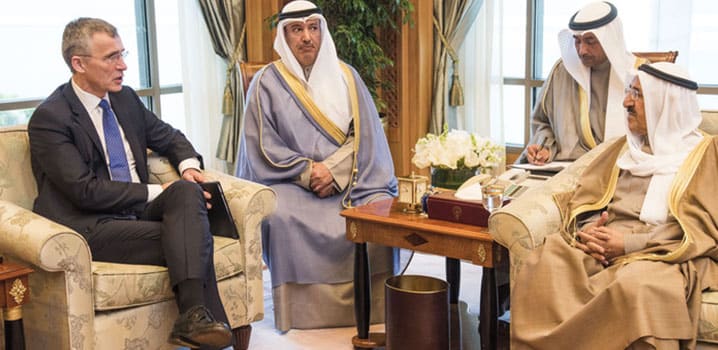
NATO has been developing relations with most of Gulf monarchies since 2004. Kuwait recently decided to establish a diplomatic mission to NATO. (Pictured: The Emir of the State of Kuwait, His Highness Sheikh Sabah Al-Ahmad Al-Jaber Al-Sabah and NATO Secretary General Jens Stoltenberg on 4 May 2016.) © NATO
Perspectives
Like other regional powers involved in the conflict, the Gulf monarchies have been trying to maximise their strategic gains in the Syrian theatre, in terms of territorial influences and local alliances. The fight against the so-called caliphate is just a piece of a broader scenario.
Due to its loss of physical territory between Syria, Iraq (and Libya), al-Baghdadi’s organisation has been transforming itself from being a non-state actor behaving like a state actor and is now carrying out large-scale terrorist attacks, just as the first al-Qaeda used to do. As a result, in Saudi Arabia’s eyes, Daesh is increasingly seen more as an internal security threat in terms of domestic attacks and the return of mujahidin, rather than a geopolitical issue. It is not by chance that Riyadh’s military engagement against Daesh has declined since the beginning of the Yemeni campaign, which instead represents a Saudi geopolitical interest vis-à-vis Teheran.
Yet, despite the complexity of the different elements and rivalries at play in the region, the Global Coalition to counter Daesh is a valuable opportunity to test in practice the state of Arab-Western military cooperation, with an eye also to the partnership between NATO and Gulf monarchies. In this framework, the GCC has shown a rare and effective example of unity in its recent history.
